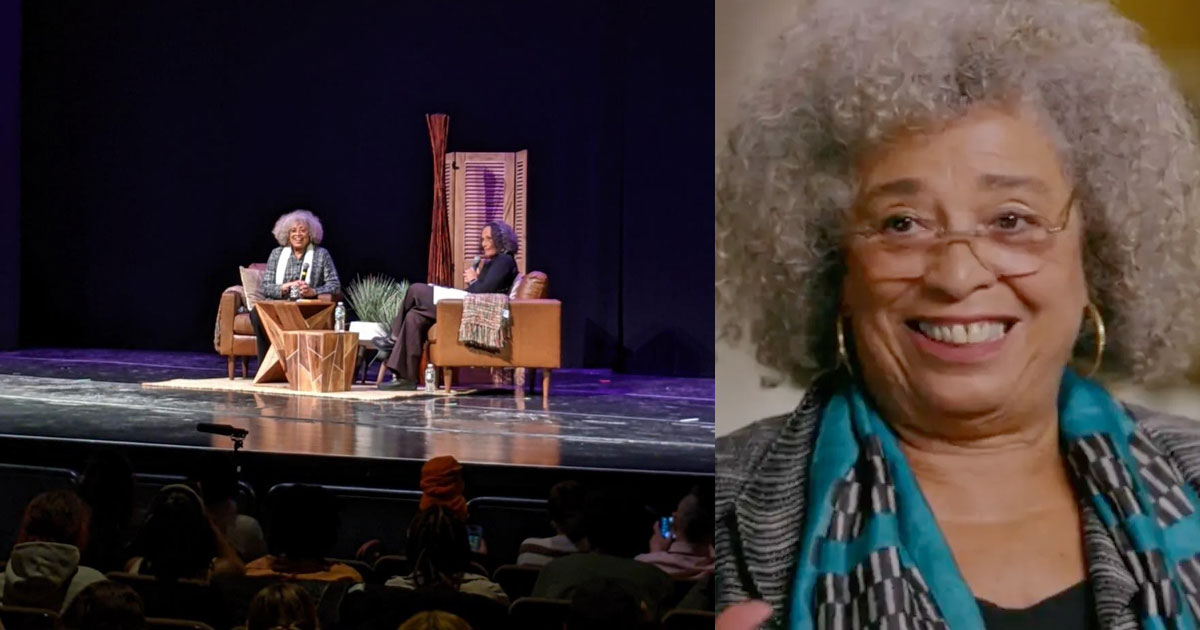This past weekend at Burlington’s Flynn Theater, the annual Black Experience celebrated Vermont’s Black communities with activists, musicians, and dancers. Billed as “Vermont’s flagship Black History Month” event, Saturday’s activities concluded with an on-stage conversation with Angela Davis, during which the famed activist and scholar reflected on racial justice movements and offered a response to her recent viral moment on PBS’ television program Finding Your Roots.
On an episode that aired last Tuesday, Davis was presented with information that she had descendants from the Mayflower by host Dr. Henry Louis Gates, Jr. A brief snippet of that episode was posted on Gates’ Twitter account in advance, which featured Davis’ visible surprise and disappointment at the news. That clip was widely shared and commented on, from white supremacists looking to contextually twist her anti-racist legacy to left critiques of the way Gates appeared to sensationalize the information.
Davis’ interlocutor on stage at the Flynn, Brown University Professor Dr. Tricia Rose, asked her about the episode. Davis replied, “Skip [Henry Louis Gates, Jr.] asked me to do that years and years ago. And I was very reluctant precisely because of the ways in which DNA is used, particularly within the criminal legal system.” She noted that her siblings eventually persuaded her to go on the program as the family only knew one person beyond their own parents: their paternal grandmother. Davis’ mother grew up in foster care, and the family had long figured that both their parents’ fathers were white.
“I never expected that this news about being descended from someone who came over on the Mayflower would be so controversial. I mean, probably half the white people in this country, at a certain point, were descended from people who came over on the Mayflower,” Davis said.
Noting that it is much easier to trace white ancestry than it is to trace Black ancestry, Davis had a particular interest in learning about her mother’s mother. All the DNA search could reveal was that she was of West African ancestry. Davis also learned that her father’s father was descended from someone who fought against the British in the American Revolution.
“If anything, I would say that I always believe that revolutions never accomplish enough. The American Revolution was a beginning. It did not go far enough because it did not get rid of slavery and it did not address the question of racism. And it represented human rights as white. It was all racialized as white. So I said, well, if anything, it makes me want to struggle even more to achieve a revolution in this country.”
Davis also addressed the need to continue to press forward after racial justice rallies and the gains made during the summer of 2020. “More people participated in demonstrations in the summer of 2020 than ever before in the history of this country and also more white people — including in Vermont — than ever before,” she said, to applause from the audience.
Davis said that urgent demands such as defunding the police must be kept alive and not relegated to the past. She also pointed out that powers-that-be on a national, state and local level will look to run interference against such causes, saying, “we also have to recognize that there are countervailing forces; there are those who are going to actively attempt to prevent us from consolidating those gains. And that is what I think we are witnessing now.”
This includes not only understanding at the local level how civilian oversight of the police is met with hostility from city leaders, but also the national conversation around critical race theory (CRT). In Vermont, CRT has been the target of events hosting white supremacist bigots in the area who view it as a threat to their racist ideology.
“Critical Race Theory is dangerous because it teaches us how to think structurally; it teaches us that racism is not about one group of people disliking another group of people. It is about the way in which economic and cultural social discrimination is etched in the very machinery of society, in all of the institutions,” Davis said. “And it has a mandate to dismantle those structures of racism.”
Matt Moore is a writer from Vermont. He is on the editorial collective of The Rake Vermont.



